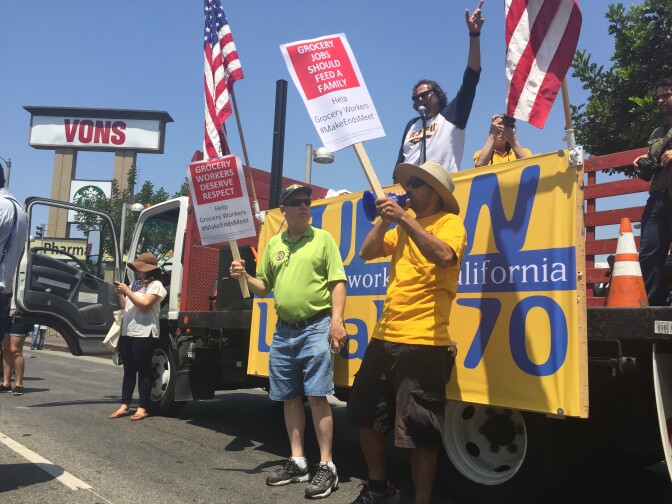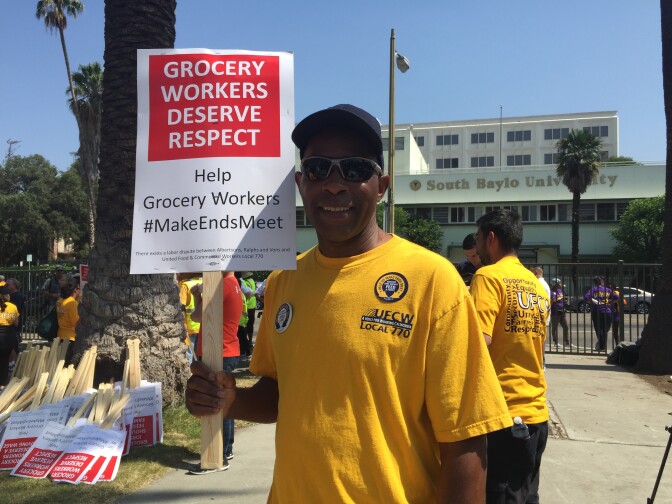This story is free to read because readers choose to support LAist. If you find value in independent local reporting, make a donation to power our newsroom today.
This archival content was originally written for and published on KPCC.org. Keep in mind that links and images may no longer work — and references may be outdated.
As grocery workers threaten strike, here’s why they’re worried
Everyone involved seems to agree a grocery workers' strike is not a great idea, but one may come to pass next week should contract negotiations continue to stall.
Workers for Ralphs, Vons, and Albertsons have authorized the United Food & Commercial Workers to call a strike if a deal isn't made by August 8. About 50,000 unionized employees in Southern and Central California have been working without a new contract since the previous one expired in March.
“The last thing that we want to do is strike,” said Local 770 Field Director Paul Edwards. “But we will if we have to.”
Grocery chains, clearly, would also like to avoid a strike, said Kendra Doyel, vice president of public relations at the Ralphs Grocery Company.
“No one wins in that situation,” Doyel said. “It’s difficult on the company. It’s very difficult on the associates, and it’s difficult on the community and customers as well.”
Looming over them is memory of the 2003 strike. It lasted four months and didn't go so well.
"Our members had to start paying a larger share of their medical coverage," Edwards said. "There were some slight pay raises, but it was a difficult strike where we don't feel either side won."
Daniel Mitchell, professor emeritus at UCLA and expert on unions and collective bargaining, agreed.
“Management lost profits and sales,” Mitchell said. “And union workers lost wages that would’ve been earned.”
That was the short-term effect. In the long run, the strike lost the companies customers who shopped in non-union stores, like Trader Joe's and Whole Foods during the strike and then simply didn't return when it ended.
"There was a lot of concern in the unionized portion of that industry whether market share had been lost because of the strike," Mitchell said, referring to the amount of an industry that a particular company controls. "A loss of share for the unionized sector of course is a gain for the others ... [the 2003 strike] may also have made it somewhat more difficult for union organizing to move into the non-union sector."
Grocery industry analyst David J. Livingston said the strike may have been a factor, but conventional supermarkets like Ralphs, Vons, and Albertsons have other problems. They've been shrinking and consolidating as online shopping, wholesale clubs, and organic retailers grow.
In Southern California, Doyel from Ralphs said, the market is particularly tight.
“It's an extremely competitive market,” Doyel said. “Everyone has to do everything they can to make sure that we're able stay here and remain competitive for future.”
For now, that means coming to a labor agreement.
“We’re doing the hard work at the bargaining table and that’s where everyone’s focus should be," said Carlos Illingworth, the Southern California director of communications and government affairs for Albertsons, Vons, and Pavilions in a statement.
Negotiations on issues like wages, benefits, and scheduling are still underway, with an up-or-down vote on management's offer likely on August 8 or 9.
Doyel said the company is preparing for the possibility of a strike, though she declined to discuss details.
Meanwhile, grocery workers around Southern California continue to picket between shifts.
Bobby Shelven, who's been in the industry for 38 years, said he's well aware of the challenges stores face, but workers still deserve a fair contract.
“People need a decent wage. We should be able to feed our families, be able to send our kids to the doctor” said Shelven, who is currently a meat manager at Ralphs. “We just want a fair contract. I love what I do, I’ve been doing it for so long.”
Shelven said no one wants to strike, but if it happens, he and his wife, who's also a grocery worker, will be there.












